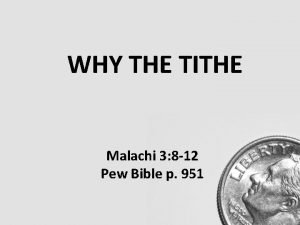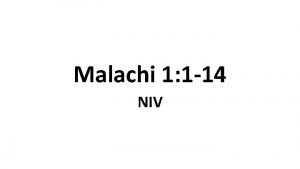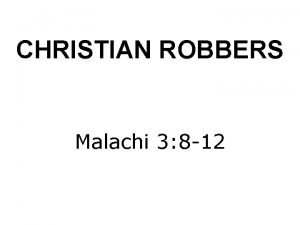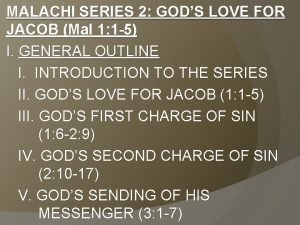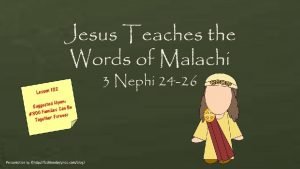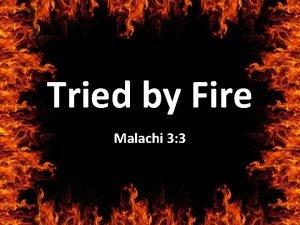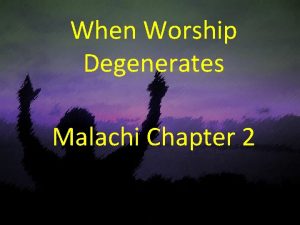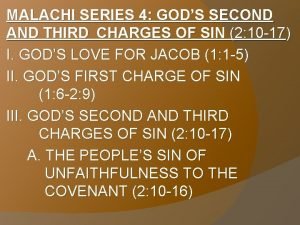MALACHI SERIES 1 INTRODUCTION TO THE SERIES I










- Slides: 10

MALACHI SERIES 1: INTRODUCTION TO THE SERIES I. THE MINOR PROPHETS Ø Jonah, Amos, Hosea – Northern Kingdom (Israel) before Assyria Ø Joel, Micah, Zephaniah, Nahum, Habakkuk, Obadiah – Southern Kingdom before Babylon Ø Ezekiel, Daniel – (major prophets) during Babylon Ø Haggai, Zechariah, Malachi – after return from Babylon

Ø Most of the minor prophets have a threefold message: the sin of the people; the coming judgment of God; and the future restoration of Israel. II. WHO WROTE THIS BOOK? Ø The book is ascribed to Malachi, whose name means “my messenger. ” Ø We know nothing about Malachi the person.

~ But after all, he was a messenger and the important thing about a messenger is the message. ~ Malachi was concerned about being faithful, not being famous. III. WHEN AND WHY WAS THIS BOOK WRITTEN? Ø written sometime after 460 B. C. Ø Nehemiah and Malachi – likely contemporaries

Ø Ø Malachi encountered the same religious situation described in Ezra 9 -10 and Nehemiah 8 -13. ~ The people were backslidden, the priests were worldly, and the nation was far from God. 1 st return from Babylon (538 -536 B. C. ) under Zarubbabel 2 nd return (458 B. C. ) under Ezra 3 rd return (445 -444 B. C. ) under Nehemiah

Ø Nehemiah spearheaded reforms to help the poor and convinced the people to shun mixed marriages, to keep the Sabbath and to bring their tithes and offerings faithfully. ~ The people’s desire to return to their homeland had not translated into a desire to walk with God. ~ As time passed, religious practices became meaningless routines, with little attention given to God’s Law.

~ Malachi rebuked and condemned these abuses, forcefully indicting the people and calling them to repentance. Ø At the same time, as over two millennia of OT history since Abraham concluded, none of the glorious promises of the Abrahamic, Davidic, or New Covenants had been fulfilled in the ultimate sense. ~ Despite a few high points in Israel’s history, the Jews seemed determined to turn away from God’s favor.

Ø THIS BOOK WAS IT WRITTEN TO CONFRONT THE SPIRIT OF COMPLACENCY AND INDIFFERENCE THAT SO EASILY OVERCOMES THE PEOPLE OF GOD. IV. WHY READ AND STUDY THIS BOOK? Ø Malachi holds a mirror before his readers, helping us assess our relationship with the living God.

~ Do we believe He loves us? Does He have our wholehearted love and obedience? Or are we only going through the motions of our relationship with Him? ~ God loves us with an unfailing passionate love and wants us to return His love by demonstrating faithfulness, integrity, purity and justice in human relationships.

V. SOME FINAL PROPHETIC WORDS Ø God’s final words in the Old Testament include a promise: Mal 4: 5. Ø Malachi was most likely the last prophet of the OT era. Ø The last prophetic words from the Old Testament still reveal hope in the coming of Christ the Messiah. ~ Malachi speaks of two messengers: John the Baptist Jesus Christ

~ And although the Book of Malachi closes the OT and marks the beginning of 400 years of prophetic silence, Malachi, however, leaves readers with the striking proclamation, “Behold, He is coming” (Mal 3: 1).

